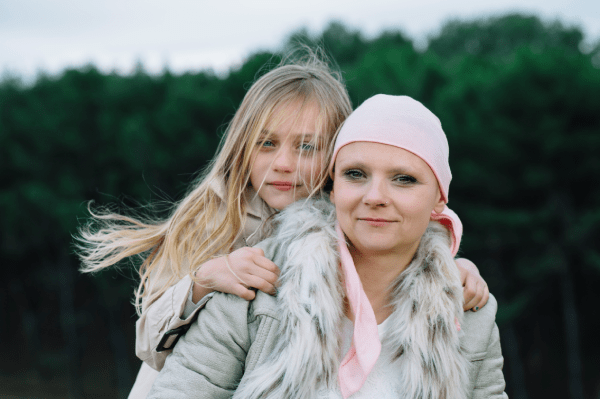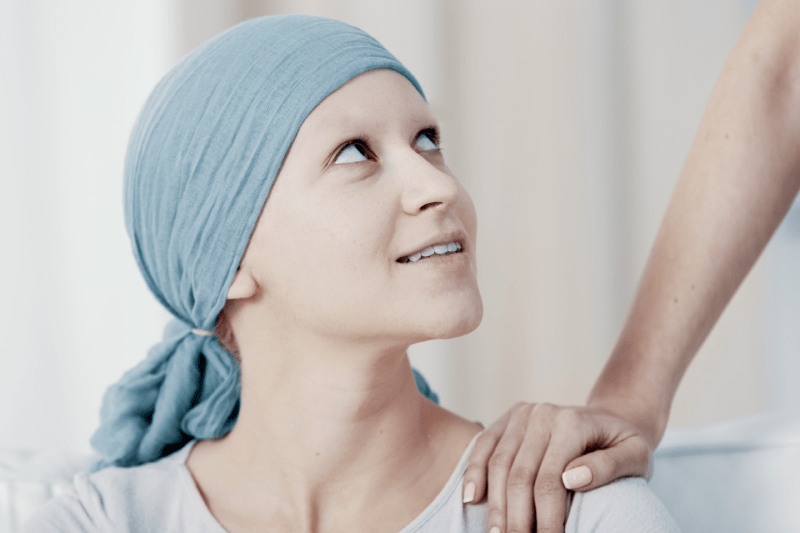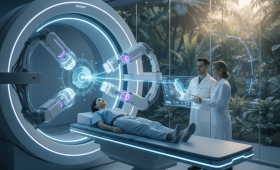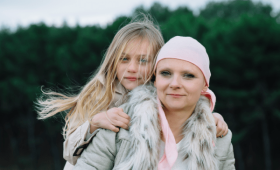What is Chemotherapy and How Does It Work?
Chemotherapy is a drug treatment used to kill cancer cells or stop them from growing. These drugs target cells that divide rapidly in the body. Since cancer cells also divide uncontrollably and rapidly, they are sensitive to this treatment. Unfortunately, some of the body’s healthy cells (such as hair follicles, oral and intestinal mucosa, and blood cells) also have similar characteristics and are affected by the treatment. This is the main reason for the side effects of chemotherapy. The goal of the treatment is to eliminate as many cancer cells as possible while causing the least amount of damage to healthy cells.
Who is Chemotherapy Applied To?
Chemotherapy can be applied to many patients who have been diagnosed with cancer. The suitability of the treatment is determined by an oncology specialist based on the type and stage of the cancer, the patient’s general health, age, and any other coexisting diseases. In some cases, it is used alone, while in others it is used in combination with other treatments such as surgery, radiotherapy, or immunotherapy.
Types and Methods of Chemotherapy Treatment
Chemotherapy drugs can be administered to the body in different ways. The most common method is intravenous application, which is usually performed using an intravenous catheter or a port system. In addition, it can be administered orally in the form of tablets or capsules, as an intramuscular injection, a subcutaneous injection, locally directly into body cavities such as the abdomen or bladder, or into the cerebrospinal fluid (intrathecally). The method of treatment varies according to the type and location of the cancer.
Treatment Process and Cycles
Chemotherapy is usually administered in “cycles.” A cycle includes the days of taking the medication, followed by a rest period for the body to recover and heal. These cycles are vital for the body to regenerate and for healthy cells to renew themselves. The number and duration of cycles are determined by the type of cancer, the drug, and the patient’s response to the treatment. The treatment usually lasts for a few weeks or months.
Preparations Made Before Starting Treatment
Before starting chemotherapy, the patient’s general health status is evaluated in detail. Blood tests, liver and kidney function tests, heart ultrasound (ECHO), and other examinations are performed. These tests are critical to determine whether the patient is suitable for the treatment and which drugs can be used safely. In addition, the patient is given detailed information about the possible side effects and how to cope with them before starting the treatment.
Most Common Side Effect: Nausea and Vomiting
One of the most common and feared side effects of chemotherapy is nausea and vomiting. However, today, there are extremely effective anti-emetic (anti-nausea) drugs available to control these side effects. These drugs can be taken regularly before and after chemotherapy to greatly prevent nausea and vomiting. Eating small, frequent meals and avoiding spicy and fatty foods can also be helpful.
Fatigue and Weakness
Chemotherapy puts a great burden on the body, which can cause severe fatigue. This fatigue is different from normal tiredness and may not go away with rest. Regular and light exercises (such as walking), sufficient sleep, and a balanced diet can help to cope with this side effect. It is very important for the patient to listen to their body and not overexert themselves.
Hair Loss: Causes and Management
Since chemotherapy targets rapidly dividing cells like hair follicles, hair loss is an inevitable side effect. The shedding usually begins within the first few weeks. After chemotherapy is completed, the hair usually grows back and can often be healthier than before. During this process, wearing a wig, hat, or scarf can be both psychologically comforting and a practical solution. Scalp cooling technology is also available in some hospitals to help reduce hair loss.
Changes in Blood Counts and Risk of Infection
Chemotherapy can affect the bone marrow and reduce the production of blood cells (leukocytes, erythrocytes, platelets). A decrease in leukocytes (white blood cells), known as leukopenia, reduces the body’s resistance to infections. For this reason, patients should avoid crowded environments, pay attention to hand hygiene, and immediately contact their doctor if they show signs of infection, such as fever.
Mouth and Throat Sores (Stomatitis)
Chemotherapy can cause inflammation and sores in the mouth and throat lining. This can lead to pain in the mouth, difficulty swallowing, and loss of appetite. Paying maximum attention to oral hygiene, using a soft-bristled toothbrush, avoiding acidic and spicy foods, and using special mouthwashes recommended by the doctor can help manage this side effect.
Nutrition and Loss of Appetite
Loss of appetite is a common problem during chemotherapy. It is very important to eat a sufficient and balanced diet for the body to respond better to treatment and cope with side effects. Eating small, frequent meals, consuming foods rich in protein and calories, and paying attention to fluid intake play a critical role in this process.

Chemotherapy and Skin Problems
Some chemotherapy drugs can cause skin dryness, redness, itching, and peeling. Protecting the skin from the sun, using moisturizers, and avoiding hot showers can help protect the skin. Any changes in the skin should be reported to the doctor or nurse.
Nail Changes
Nail discoloration, thinning, or brittleness can also be a side effect of chemotherapy. It is important to keep nails short, avoid chemical polishes, and use gloves to protect the nails.
Neuropathy (Nerve Damage)
Some chemotherapy drugs can cause numbness, tingling, pain, or loss of sensation in the hands and feet (peripheral neuropathy). This side effect can become permanent. For early diagnosis and management, symptoms should be reported to the doctor immediately. Supplements such as Vitamin B6 can be used under the supervision of a doctor.
Management of Diarrhea and Constipation
Chemotherapy can affect bowel movements, causing either diarrhea or constipation. In case of diarrhea, it is recommended to drink plenty of fluids and avoid fibrous foods; in case of constipation, it is recommended to increase the intake of fibrous foods and plenty of fluids. Medications recommended by the doctor can be used for both conditions.
Psychological and Emotional Support
Cancer treatment can also be psychologically draining for patients. Feelings such as depression, anxiety, anger, and fear may be experienced. Seeking support from a psychologist or psychiatrist during this process can help both the patient and their family to get through this difficult period in a healthier way. The psychological support units within hospitals can be helpful in this regard.
Post-Chemotherapy Period
Even after the treatment is over, some side effects may continue or new ones may appear. It takes time for the body to fully recover. During this period, continuing regular doctor check-ups, paying attention to nutrition and exercise will speed up the recovery process.
Chemotherapy Treatment Prices in Turkey: SGK Coverage
In Turkey, chemotherapy treatment is largely covered by the Social Security Institution (SGK). For patients with SGK coverage, chemotherapy treatment is almost free in state hospitals and university hospitals. High-cost drugs are also covered by the SGK.
Chemotherapy Process in State Hospitals
Chemotherapy treatment in state hospitals is usually administered in outpatient chemotherapy units. Patients may need to make an appointment and get their medications from the pharmacy. Waiting times may be longer due to the high volume of patients, but the quality of treatment is generally high and all costs are covered by the SGK.
Cost of Chemotherapy in Private Hospitals
In private hospitals, chemotherapy can be received by paying a difference fee in hospitals that have an agreement with the SGK. These difference fees may vary depending on the hospital’s pricing policy, the patient’s room preference, and the consumables used. Some private hospitals have their own chemotherapy drugs and the patient is not expected to obtain them.

Supplemental Health Insurance and Chemotherapy
Supplemental health insurance can cover the difference fees in private hospitals that do not have an agreement with state hospitals, or some additional costs not covered by the SGK. The policy content is important; it must be confirmed with the insurance company whether it covers serious illnesses such as chemotherapy.
Prices of Chemotherapy Drugs
Chemotherapy drugs can be very expensive, but they are covered by the SGK in Turkey. Since some of the drugs are imported from abroad, their prices may vary depending on the exchange rate, but patients are not affected by this cost.
Costs of Medications and Supplies to Reduce Side Effects
Additional products such as anti-nausea drugs, mouthwashes for mouth sores, or supportive supplements can be obtained with a prescription and are generally covered by the SGK. However, the costs of some over-the-counter support products may be borne by the patient.
The Role of Family and Close Circle
The chemotherapy process affects not only the patient but also the family. Family members’ support can help alleviate the physical and psychological burden of the treatment. Communicating with the patient, giving them morale, and helping with daily tasks are of vital importance during this process.
Hygiene Rules to Be Followed During Chemotherapy
Since the immune system is weakened, hygiene becomes much more important. Hands should be washed frequently, fruits and vegetables should be cleaned very well, and raw meat and eggs should be avoided. Wearing a mask in crowded and enclosed environments can reduce the risk of infection.
Chemotherapy and Sexual Life
Chemotherapy can affect sexual life due to decreased libido and physical fatigue. Precautions should be taken to ensure sexual intercourse is safe during this process. The potential effects of treatment on fertility (infertility) should be discussed with the doctor, and if necessary, fertility preservation methods (freezing eggs or sperm) should be considered.
Alternative and Complementary Medicine
During chemotherapy, trying scientifically unproven herbal supplements or alternative methods for cancer treatment can interact with chemotherapy drugs and lead to serious health problems. Therefore, you must talk to your oncologist before trying any alternative methods.
Post-Chemotherapy Recovery
After the treatment is completed, it can take a few months or up to a year for the body to fully recover. During this period, one should slowly return to normal life, and maintain healthy eating and light exercise habits. Check-ups should not be neglected.
Chemotherapy and Work Life
The treatment process can negatively affect work life due to side effects such as fatigue. Patients may take time off from work with the recommendation of their doctor. It is important to communicate with the employer and get a doctor’s report in this regard.
Conclusion: The Future of Chemotherapy and Hope
Chemotherapy is an indispensable weapon in the fight against cancer. Thanks to developments in the medical world, new drugs that are more effective and have fewer side effects are being discovered every day. Personalized treatments and smart drugs are shaping the future of chemotherapy. It should be remembered that cancer is now considered a chronic disease and chemotherapy helps patients to live a longer and better quality life. In this process, being hopeful, being well-informed, and cooperating with the doctor are the most important steps.



